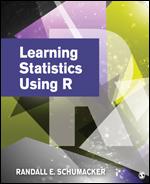Student Resources
This site is intended to enhance your use of Learning Statistics Using R by Randall E. Schumacker. Please note that all the materials on this site are especially geared toward maximizing your understanding of the material.
Acknowledgments
We gratefully acknowledge Randall E. Schumacker for writing an excellent text and for reviewing the assets on this site. Special thanks are also due to Sara Tomek at The University of Alabama for creating the materials on this site.
Download R Files
The R script files that contain the functions used in the chapters are available here. Each chapter contains one or more R functions which are helpful in examining the various applications presented in the chapters. The R functions are explained in each chapter according to the basic input, process, and output operations. The R functions can be opened and run in the R GUI Console window or in R Studio. Results will be the same as in the chapters, except where it is noted that the set.seed () command was not used.
Errata
This page includes errata from Learning Statistics Using R.
P. 46: P (3) = 3/36 = 1/12 ....., which has a probability of .0833.
should be: P (3) = 2/36 = 1/18 ....., which has a probability of .055.
R Basics
Quizzes: Flexible self-quizzes allow you to practice the concepts from each chapter.
eFlashcards: These study tools reinforce your understanding of key terms and concepts that have been outlined in the chapters.
Research Methods
Quizzes: Flexible self-quizzes allow you to practice the concepts from each chapter.
eFlashcards: These study tools reinforce your understanding of key terms and concepts that have been outlined in the chapters.
Probability
Quizzes: Flexible self-quizzes allow you to practice the concepts from each chapter.
eFlashcards: These study tools reinforce your understanding of key terms and concepts that have been outlined in the chapters.
Sampling and Populations
Quizzes: Flexible self-quizzes allow you to practice the concepts from each chapter.
eFlashcards: These study tools reinforce your understanding of key terms and concepts that have been outlined in the chapters.
Central Limit Theorem
Quizzes: Flexible self-quizzes allow you to practice the concepts from each chapter.
eFlashcards: These study tools reinforce your understanding of key terms and concepts that have been outlined in the chapters.
Sampling Distributions
Quizzes: Flexible self-quizzes allow you to practice the concepts from each chapter.
eFlashcards: These study tools reinforce your understanding of key terms and concepts that have been outlined in the chapters.
Statistical Distributions
Quizzes: Flexible self-quizzes allow you to practice the concepts from each chapter.
eFlashcards: These study tools reinforce your understanding of key terms and concepts that have been outlined in the chapters.
Graphing Data
Quizzes: Flexible self-quizzes allow you to practice the concepts from each chapter.
eFlashcards: These study tools reinforce your understanding of key terms and concepts that have been outlined in the chapters.
Central Tendency and Dispersion
Quizzes: Flexible self-quizzes allow you to practice the concepts from each chapter.
eFlashcards: These study tools reinforce your understanding of key terms and concepts that have been outlined in the chapters.
Hypothesis Testing
Quizzes: Flexible self-quizzes allow you to practice the concepts from each chapter.
eFlashcards: These study tools reinforce your understanding of key terms and concepts that have been outlined in the chapters.
Chi-Square Test for Categorical Data
Quizzes: Flexible self-quizzes allow you to practice the concepts from each chapter.
eFlashcards: These study tools reinforce your understanding of key terms and concepts that have been outlined in the chapters.
z Test for Differences in Proportions
Quizzes: Flexible self-quizzes allow you to practice the concepts from each chapter.
eFlashcards: These study tools reinforce your understanding of key terms and concepts that have been outlined in the chapters.
t Test for Mean Differences (2 groups)
Quizzes: Flexible self-quizzes allow you to practice the concepts from each chapter.
eFlashcards: These study tools reinforce your understanding of key terms and concepts that have been outlined in the chapters.
F Test for Mean Differences (3 or more groups)
Quizzes: Flexible self-quizzes allow you to practice the concepts from each chapter.
eFlashcards: These study tools reinforce your understanding of key terms and concepts that have been outlined in the chapters.
Correlation Tests of Association
Quizzes: Flexible self-quizzes allow you to practice the concepts from each chapter.
eFlashcards: These study tools reinforce your understanding of key terms and concepts that have been outlined in the chapters.
Linear Regression Tests of Prediction
Quizzes: Flexible self-quizzes allow you to practice the concepts from each chapter.
eFlashcards: These study tools reinforce your understanding of key terms and concepts that have been outlined in the chapters.
Multiple Regression
Quizzes: Flexible self-quizzes allow you to practice the concepts from each chapter.
eFlashcards: These study tools reinforce your understanding of key terms and concepts that have been outlined in the chapters.
Logistic Regression
Quizzes: Flexible self-quizzes allow you to practice the concepts from each chapter.
eFlashcards: These study tools reinforce your understanding of key terms and concepts that have been outlined in the chapters.
Loglinear Regression
Quizzes: Flexible self-quizzes allow you to practice the concepts from each chapter.
eFlashcards: These study tools reinforce your understanding of key terms and concepts that have been outlined in the chapters.
Replication of Statistical Tests
Quizzes: Flexible self-quizzes allow you to practice the concepts from each chapter.
eFlashcards: These study tools reinforce your understanding of key terms and concepts that have been outlined in the chapters.
Synthesis of Research Findings
Quizzes: Flexible self-quizzes allow you to practice the concepts from each chapter.
eFlashcards: These study tools reinforce your understanding of key terms and concepts that have been outlined in the chapters.

